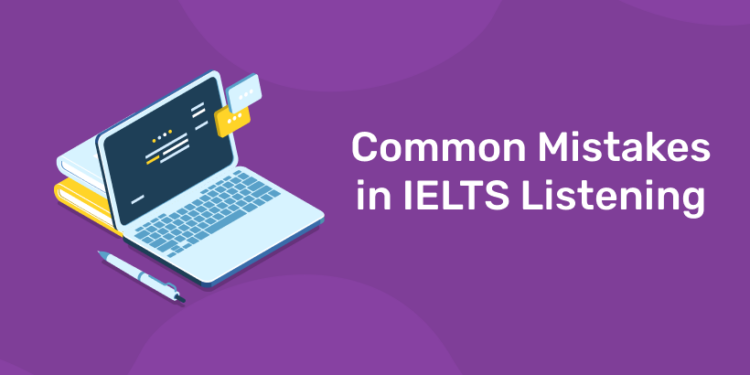Table of Contents
IELTS Listening pitfalls to watch out for. Discover the most frequent errors candidates make and how to overcome them for a higher score.
The IELTS Listening test evaluates the candidate’s ability to understand spoken English through a series of audio recordings. It consists of four sections with increasing difficulty, covering various topics and accents. During the test, candidates will hear conversations, monologues, and discussions. They are required to answer ten questions for each section. The audio is played only once, making active listening and note-taking essential skills. The test lasts approximately 30 minutes, and scores are reported on a band scale from 0 to 9. Regular practice and exposure to diverse listening materials can enhance your performance in the IELTS Listening test. In this article we shall discuss Common Mistakes in IELTS Listening.
What is IELTS?
IELTS stands for the “International English Language Testing System.” It is one of the most widely recognized English language proficiency tests in the world. IELTS is designed to assess the language ability of non-native English speakers who aim to study, work, or immigrate to English-speaking countries. The IELTS test is developed and managed jointly by the British Council, IDP: IELTS Australia, and Cambridge Assessment English. It evaluates candidates in four key language skills: Listening, Reading, Writing, and Speaking.
There are two main versions of the IELTS test: IELTS Academic and IELTS General Training. The IELTS Academic module is intended for students seeking higher education or professional registration. While the IELTS General Training module is suitable for those pursuing work experience, training programs, or immigration purposes.
The test is conducted in over 140 countries and is accepted by thousands of universities, colleges, and government agencies worldwide. IELTS is known for its high-quality, unbiased assessment, providing a fair and accurate evaluation of a candidate’s English language proficiency.
What is IELTS Listening?
The IELTS Listening test is one of the four components of the International English Language Testing System (IELTS). It is designed to assess your listening skills and ability to comprehend spoken English in various contexts. The Listening test is the same for both the IELTS Academic and IELTS General Training modules.
Test Format:
The test consists of four sections, and each section contains ten questions.The sections gradually increase in difficulty as you progress through the test. You will hear a range of audio recordings, such as conversations, monologues, lectures, and discussions, representing authentic English accents and styles.The audio will be played only once, so you need to listen carefully and take notes as necessary.You will have time at the end of each section to transfer your answers to the answer sheet.
Test Duration:
The IELTS Listening test lasts approximately 30 minutes, including the time given to transfer your answers.
Test Scoring:
Each correct answer earns one point.The final score is converted into a band score ranging from 0 to 9.
What is Accessed in IELTS Listening?
In the IELTS Listening test, your ability to understand spoken English is assessed. The test is designed to evaluate how well you can comprehend various types of listening materials, which reflect real-life situations.
The Listening test consists of four sections, and each section contains one or more audio recordings. The recordings are played only once, so it’s essential to listen attentively and capture the information presented. Here’s what is assessed in each section:
Section 1:
This section usually involves a conversation between two speakers in a daily social context. For example, a dialogue between a customer and a receptionist, or a conversation between friends. The topics are straightforward and typically involve general information, such as making reservations, giving directions, or discussing plans.
Section 2:
In this section, you will hear a monologue or a talk. The topics are related to everyday situations, such as:
- a tour guide giving information about a place,
- a lecturer talking about an event or activity, or
- someone providing instructions or explanations.
Section 3:
Section 3 presents a conversation between multiple speakers, often in an educational or training setting. This section is usually more complex than the previous ones, with discussions between:
- students and a tutor, or
a group of friends planning a project, etc.
Section 4:
This section consists of a longer lecture or talk on an academic topic. The content is more challenging, and the speaker may have a native-like accent. The topics can range from scientific subjects to social issues or historical events.
Throughout the Listening test, the following skills are assessed:
Understanding main ideas:
Can you identify the main points and the overall message of the listening material?
Identifying specific information:
Are you able to catch important details and specific facts mentioned in the recording?
Recognizing supporting details:
Can you pick up on examples, explanations, or supporting information given in the audio?
Understanding opinions and attitudes:
Can you distinguish the speaker’s attitude or opinion on certain topics from the context?
Following instructions:
Are you able to comprehend and follow instructions or directions provided in the listening material?
Inferring meaning:
you infer the meaning of unfamiliar words or phrases based on the context?
Understanding relationships:
Can you recognize relationships between people or places mentioned in the recording?
Common Mistakes in IELTS Listening
In the IELTS Listening test, there are several common mistakes that test-takers often make. Being aware of these mistakes can help you avoid them and improve your overall score. Here are some of the most common errors:
Not reading the instructions carefully:
Many candidates overlook important instructions at the beginning of the test, leading to mistakes later on. Make sure you understand the format, numbering system, and any specific requirements for each section.
Focusing on irrelevant details:
Some test-takers get caught up in minor details and miss the main point or key information. Practice identifying the main ideas and important facts while listening.
Spelling errors:
Correct spelling is crucial in the Listening test. Be careful with names, places, and unfamiliar words. Check your spelling during the designated time after each section.
Not predicting the answers:
Before listening to a recording, read the questions quickly, and try to anticipate what the answers might be. This will help you focus and recognize the correct information.
Getting stuck on one question:
If you can’t answer a question immediately, don’t dwell on it. Move on to the next one and come back to the difficult question later if you have time.
Ignoring the word limit:
Pay attention to the word limit for each answer. If the question asks for no more than three words, using four or more words will result in a wrong answer.
Not familiarizing yourself with different English accents:
The Listening test includes various English accents. It’s essential to expose yourself to different accents during your preparation to be able to understand them during the test.
Not using the time wisely:
There is a short time before each section to read the questions. Use this time to prepare and underline keywords. Also, use the breaks between sections to quickly preview the upcoming questions.
Losing focus during the recording:
Concentration is crucial during the Listening test. Avoid distractions and stay focused throughout the audio recording.
Guessing randomly:
In IELTS Listening, there is no penalty for wrong answers, so make an educated guess if you’re unsure. Eliminate obviously wrong options and choose the one that seems most reasonable.
Tips to avoid Common Mistakes in IELTS Listening
To avoid common mistakes in the IELTS Listening test and maximize your score, follow these helpful tips:
Practice regularly:
Regular practice with sample tests and listening exercises will improve your listening skills. It will also help you become familiar with the test format.
Work on your listening skills:
Engage in various listening activities, such as watching movies, TV shows, podcasts, and news broadcasts in English. This will help you become accustomed to different accents and speaking styles.
Read instructions carefully:
Pay close attention to the instructions and any specific requirements for each section of the Listening test.
Predict the answers:
Before listening to the recording, quickly skim the questions and try to predict what the answers might be. This will give you a better idea of what to listen for.
Underline keywords:
While reading the questions, underline or highlight keywords that will help you focus on relevant information during the listening.
Use the time wisely:
Utilize the time given before each section to read the questions thoroughly and identify the main points. Also, use the breaks between sections to preview the upcoming questions.
Stay focused and attentive:
Concentrate during the entire listening recording and avoid distractions. Train your mind to stay engaged with the material.
Check your spelling:
Correct spelling is essential in the Listening test. Practice writing answers with proper spelling and pay attention to the word limit.
Listen for synonyms and paraphrasing:
The answer may not be given using the same words as in the questions. Listen for synonyms and paraphrased expressions.
Don’t get stuck on one question:
If you’re unsure about an answer, don’t spend too much time on it. Move on and return to it later if you have time.
Practice multitasking:
Train yourself to read the questions, listen to the recording, and write answers simultaneously. This will help you manage your time effectively during the test.
Review your answers:
Use any spare time at the end of each section to review your answers and make sure they make sense and fit within the word limit.
Develop your note-taking skills:
Practice taking brief notes while listening to recordings. These notes can help you remember key details.
Stay calm and confident:
Test anxiety can hinder your performance. Stay relaxed, trust your preparation, and tackle the questions with confidence.
Learn from your mistakes:
After each practice test, review the answers you got wrong and understand why you made those errors. Learning from your mistakes is an essential part of improving your performance.
crack ielts exam with online coaching ! join now !
Scope of IELTS
The International English Language Testing System (IELTS) is one of the most widely recognized and accepted English language proficiency tests worldwide. Its scope is extensive and covers various aspects:
Study Abroad:
One of the primary purposes of IELTS is for students planning to study in English-speaking countries. Many universities and educational institutions require IELTS scores as part of their admission criteria.
Work Opportunities:
IELTS scores are often used as a measure of language proficiency by employers in English-speaking countries. Job seekers from non-English-speaking countries may need to take the test to demonstrate their language skills.
Immigration:
Some countries use IELTS scores as a requirement for immigration or visa applications. It is common for immigration authorities to ask for specific IELTS scores to assess language ability.
Professional Registration:
Certain professional bodies and organizations may require IELTS scores for registration or licensing purposes. This is particularly common in fields where effective communication is crucial, such as healthcare and teaching.
Exchange Programs:
Students participating in exchange programs or international scholarships often need to submit IELTS scores to demonstrate their language proficiency.
English Proficiency Certification:
Even if not mandatory, some individuals take the IELTS test to obtain an official certification of their English language skills, which they can use in various contexts.
Personal Development:
IELTS can serve as a personal goal for language learners, motivating them to improve their English skills and achieve higher levels of proficiency.
Academic and Research Purposes:
Scholars and researchers who want to publish their work in English-language journals may be required to show their language proficiency through IELTS scores.
Conclusion:
Avoiding common mistakes in the IELTS Listening test requires a combination of focused preparation and effective test-taking strategies. Practice active listening to grasp main ideas and specific details, while also becoming familiar with different English accents. Time management is crucial, so use the pre-listening time wisely, and don’t linger on challenging questions during the recording. Pay close attention to spelling and word limits to ensure accurate responses. Stay calm and composed during the test to maintain concentration and avoid unnecessary errors. With consistent practice and a thoughtful approach, test-takers can optimize their performance and achieve better results in the IELTS Listening test.
Tips to avoid Common Mistakes in IELTS Listening: FAQs?
1. What is the format of the IELTS Listening test?
Ans. The IELTS Listening test consists of four sections, and each section contains one audio recording. The recordings are played only once. You will have time to read the questions before each section and to check your answers after the recording.
2. How long is the IELTS Listening test?
Ans. The IELTS Listening test takes approximately 30 minutes. The audio recordings and questions are designed to be completed within this time frame.
3. What types of questions can I expect in the Listening test?
Ans. The Listening test includes various question types, such as multiple-choice, matching, labeling diagrams, form completion, short-answer questions, and sentence completion.
4. Are there different accents in the IELTS Listening test?
Ans. Yes, the test includes a variety of English accents, such as British, American, Australian, Canadian, and others. It’s essential to expose yourself to different accents during your preparation.
5. Is there a penalty for incorrect answers in the Listening test?
Ans. No, there is no penalty for incorrect answers in the IELTS Listening test. You should attempt all questions even if you are unsure about the answers.
6. Can I write in capital letters for my answers?
Ans. Yes, you can write your answers in either capital letters or lower-case letters. However, it’s essential to be consistent throughout the test.
7. Can I use a pen during the Listening test?
Ans. No, you must use a pencil to write your answers on the answer sheet. Pens are not allowed.
8. Can I take notes during the Listening test?
Ans. Yes, you are encouraged to take notes while listening to the recordings. Note-taking can help you remember key details and information.
9. Can I listen to the audio recordings again after the test?
Ans. Unfortunately, you won’t have access to the audio recordings after the test. Make sure to focus and listen attentively during the test.
10. What happens if I miss an answer in one section? Can I still do well overall?
Ans. Yes, you can still do well in the overall Listening test even if you miss some answers in one section. Each section carries an equal weightage, so try to make up for any mistakes in other sections.
11. Is there any specific vocabulary or topic that I should study for the Listening test?
Ans. The topics covered in the IELTS Listening test are diverse and can include everyday conversations, educational content, news, and more. While there is no specific vocabulary list, it’s helpful to expose yourself to a wide range of topics during your preparation.
| Related Links | |
| All About IELTS Exam | IELTS Reading Practice Test |
| IELTS Listening Practice Test | IELTS Writing Practice Test |
| IELTS Speaking Practice Test | Vocabulary in IELTS |











